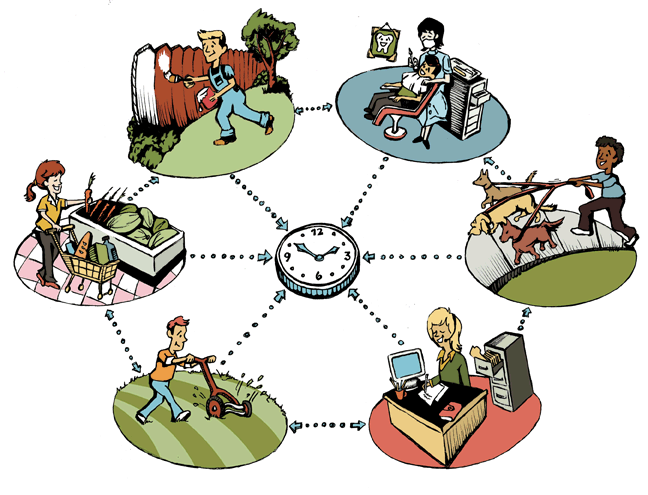These are, to put it gently, unsettling times. A triple whammy confronts us: climate change, peak oil, and a global economy in a possible death spiral. With things spinning so badly out of control, it’s easy to feel daunted.
A century ago, the poet William Butler Yeats described chaos’s onset this way: “The center cannot hold.” While his words still resonate, they don’t quite capture the current crisis, whose cause lies precisely in this: The global economy has no center. It’s a system in which capital sloshes from money center to tax haven, and corporations, in the words of writer David Ehrenfeld, are “everywhere and nowhere.” The result: From the Hudson Valley to Hong Kong, people are plugged into an economic matrix that has no face and is indifferent to yours. Talk about your primal helplessness! Here we are, attached to the same global teat, the milk is slowing to a trickle, and Mama’s on crank and doesn’t care.
Is it end-game time? Yes, if we’re referring to the era of plentiful, cheap oil. But don’t assume a high-tech Dark Ages is upon us. Out of the rubble of the old, a new, postglobal economic arrangement is emerging.
This is bracing in and of itself, and there’s more good news chugging along behind it. Though still very early-stage, this transformation is picking up momentum rapidly, and it has the potential to deliver deep renewal, not just marginal survival. Raise your hands if you prefer community to consumerism, empowerment to infantilization, autonomy to anonymity! I thought so.
The seeds of this next economy are sprouting in the Hudson Valley and a thousand other places, too. Though the particulars vary from region to region, the underlying principles are the same. Focus on local—local businesses, local agriculture, and local energy. Bring heart into the economy by strengthening the networks of connection among people. Do it on a grassroots level—people power!—and do it structurally, through institutions that keep the local system thriving and resilient.
Time = Money
One such institution is the Time Bank. The concept, which was invented by lawyer Edgar Cahn close to three decades ago, is as simple as it is innovative. People volunteer their time, but instead of just giving, they also receive. For every hour of service they provide, they get an hour back. Throw a couple hundred people with a wide variety of skills into the pot, and you can get anything you want at the Time Bank restaurant, maybe including Alice.
For Woodstock resident Kristine Flones, the Time Bank was love at first listen. She first heard about the concept in late 2006 at a Newburgh presentation by Edgar Cahn. “I had an instant connection with what I heard,” she says. “Time Banks offer a paradigm shift to a different, heart-based way of living. They can take us beyond our scarcity-based money system to a culture of abundance, sustainability and, dare I say it, happiness.”
Flones was so taken by the concept that she decided to launch a Time Bank in her hometown. The rest, as they say, is history. In the roughly two years since its founding, the Woodstock Time Bank has blossomed into a thriving and rapidly-growing community of over 200 members. “We’re one of the wunderkinds of the Time Bank world,” says Flones.
Woodstock resident Harriet Kazansky speaks glowingly of the Time Bank. She has tapped into it to have (deep breath, now!) the outside of her house stained, her new kitchen plumbed, electrical work performed, rooms painted, gardening done, furniture moved, fixtures hung, a skylight repaired, and an outside water spigot installed. “Pretty much anything you can imagine, I’ve used the Time Bank for,” says Kazansky.
Heidi Washburn is another booster. A year ago, a significant birthday was approaching for the Bearsville resident. Her daughter kept pushing her to throw a big party, but it felt like too much work. Then a light went off: the Time Bank! Volunteers prepared the house—no small matter, by Washburn’s account—and cooked for and photographed the event. A nonevent became a grand success.
In addition to networking volunteers, Time Banks build community. The Woodstock Time Bank hosts regular social events, and what’s more, participating in an informal “gift economy” has its own special magic. Reports Washburn, “Volunteers helped out with my birthday party with a wonderful, generous spirit you rarely get when you’re simply hiring people.”
Time Banks are also a great resource for nonprofits. This is because charitable organizations often rely on volunteers—more so than ever during these cash-strapped times—and it’s much easier to recruit people when they know they’ll get something back, even if it’s not a paycheck. Family of Woodstock is one of several nonprofits that are partnering with the Woodstock Time Bank. “It’s been a very positive experience,” says Family’s Jess Robie.












